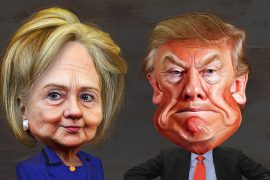
The Paradox of Choices In America
The selection of choices is larger at an American supermarket than in Europe. Is this the result of smart marketing strategies or because American customers want the freedom of choices?
When I was 20, I moved from France to Germany. Twenty years later, I moved from Germany to the States. Doing errands in Germany in the 90s was easy. First, I could find products similar to those in French supermarkets. Second, when my choices were too limited, every time I visited my parents, I filled my car with what I missed. I guess I expected exactly the same for my new American life. I was wrong.
Giant is the closest supermarket to my home. Thus, it was logical to go there for my first grocery shop. While looking for the products I was used to, I also noticed this store had many more cereals and chips than those in Germany. But, it was only when I went to CVS to buy some fever medication for my son that I realized how many choices I was given. I felt truly overwhelmed by the options.
Today, I went to CVS and counted how many options it offers for children’s fever medication: I counted 50!
Having so many choices makes it hard to choose, and not only because of the number of options. When I stood in front of the CVS shelves for the first time, my goal was to buy the best product for my needs. Instead, I found myself struggling with the many decisions I had to make.
In reality, I felt that the many choices offered to me were between really similar products. It was all about choosing between two or three active substances, prepared or packed in different ways: liquid, solid, or chewable? 10, 30, 100, or 1,000 tablets? Pink or green box? Advil or Motrin?
Honestly, we’re given more opportunities to choose in the US than in France or Germany, and not only at the supermarket or drugstore. My younger children go to American schools. I’d say that the most important education tool used by their teachers is “the choice” option.
“Are you sure this is the right choice?” is a sentence I have fully integrated in my vocabulary after hearing it so often during the last three years. American children are taught to make choices early in their education.
Confronted with the paradox of having to choose between so many options, I can’t stop asking myself if this a cultural phenomenon or the result of marketing strategies. In other words, do American companies develop so many product options in order to stay visible in the supermarket shelves? Or do they offer so may choices because the average American customer wants to have the freedom to choose?
While researching this subject, I discovered the work of two American psychologists that shed some light on the paradox of choices in America.
The downside of excessive choices
Sheena Iyengar, a management professor at Columbia University Business School, gave a Ted Talk about the downside of excessive choices. According to her research, when shoppers are given the option of choosing among a few or many jams, they are more interested in the larger assortment. But, when they have to pick only one, they are 10x more likely to make a purchase if they choose from six rather than 24 flavors of jams.
Dr. Iyengar also found out that it’s easier to choose from options sorted into categories. Obviously, I have a problem with the sorting system at CVS. Children’s fever medication are presented together, but then the brand is the next criteria, leaving me alone in front of a colorful wall.
One may assume that these difficulties should vanish after living in a new country for several years. They don’t. Today, when I have to buy a replacement for an item, I’ll spend a few minutes trying to figure out which flavor I had or checking to see if the differences between boxes are only design-based or due to a product change.
Some people might think I wasn’t trained to make choices at a drugstore. That is true. To buy the same type of medication in Germany or France, I’d go to a pharmacy and talk to a pharmacist. He or she would make the choice for me, or at least ask me if a generic is okay.
A few weeks ago, a reader left a comment about my article “15 things I never did before moving to the US.” He thought my blog screamed “my way, my country, my culture.” Perhaps my talking about differences makes him feel uncomfortable. Countries and people are diverse and, of course, present different cultural references. I’m lucky to have lived in France, Germany, and the United States, and this experience gives me a curious gaze on the world.
That being said, American customers generally have more choices. But, is more always better?
Is more always better?
Barry Schwartz, another American psychologist, has analyzed the process of choice. He even wrote a book on the subject. In The Paradox of Choices, he stated that choices are synonymous with paralysis because they make decisions too difficult and can make people feel miserable.
According to Schwartz, adding options to peoples’ lives will increase their expectations and the risk of regret. With many options, it’s easy to fall into regret. In the end, making a bad choice feels like failure “because there is no excuse for bad choices.
Research certainly acknowledges that we could live with fewer choices in America. However, successful non-American brands offer plenty of options to match the market. I think of Bonne Maman jams or Barilla pasta, both brands with many flavors or types.
I think the United States has been the country of paradox for some time. America sent people to the moon, but its infrastructure is way behind the European standard. American customers can choose between hundreds of cereals, cookies, and chips, but for the last presidential election, choices were thin.
For the rest of my time in the US, I still have a long road ahead of me.





It is so refreshing to read about the experience of a European in America, and more specifically, one who lives in my neighborhood and shops at CVS for fever medicines like I do. We experience the challenge of choosing from 50 choices of medicine with the same bewilderment! Medications sold here, even ones sold over the counter, come with warnings about side effects including life-threatening ones. They can be returned for a refund if the package is broken or the contents contaminated. Our new President comes with no such disclosure about dangers nor any chance to return him because he IS, without doubt, a damaged package. We can only “Swallow the bitter pill” and hope it will not kill us.
Margaret B.